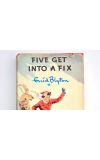
03 Jul 2012 11:23:29
Blyton's stories remain popular today, with over half a million copies of the Famous Five books sold every year, but they are dogged by accusations of sexism and implicit racism. The books were even reworked two years ago to give them more appeal to modern children, with changes including replacing the word "tinker" with "traveller" and making the text more gender-neutral (Anne loves teddies rather than dolls). But the poll of 20,000 adults, carried out by children's charity Plan UK, found the adventures of Julian, Dick, George, Anne and Timmy the dog were the most popular childhood reads by some way, taking almost 30% of the vote ahead of Roald Dahl's Charlie and the Chocolate Factory with 22% and CS Lewis's The Lion, the Witch and the Wardrobe with 19%.
Anna Sewell's Black Beauty was fourth, and Winnie the Pooh fifth, with the top 10 rounded out by Alice in Wonderland, The BFG, The Wind in the Willows, the Mr Men series and a third Dahl title, Matilda.
Four out of five of the adults surveyed said they read, or would read, their favourite books to their own children, and 26% said their oldest children's book had passed down through two generations of their family.
The survey was carried out to launch Plan UK's Facebook app, promoting girls' education. The charity says 75 million girls worldwide are not in school and 80 million young women between the ages of 15 and 24 cannot read or write. Its app allows users to find out which of the top 50 children's books they have read, before choosing whether to donate a virtual book to fund girls' education overseas.
"Books and reading clearly have a fundamental impact on our lives and play a crucial role in education," said chief executive Marie Staunton. "Unfortunately, many children, especially girls, simply don't get the choice to go to school to learn to read and write. If we want to end the cycle of poverty, one of the single best investments we can make is supporting girls to stay in school. By donating a virtual book through Plan's new app, users can help give girls the education they need to move themselves from a life of poverty, to a future with opportunity."

